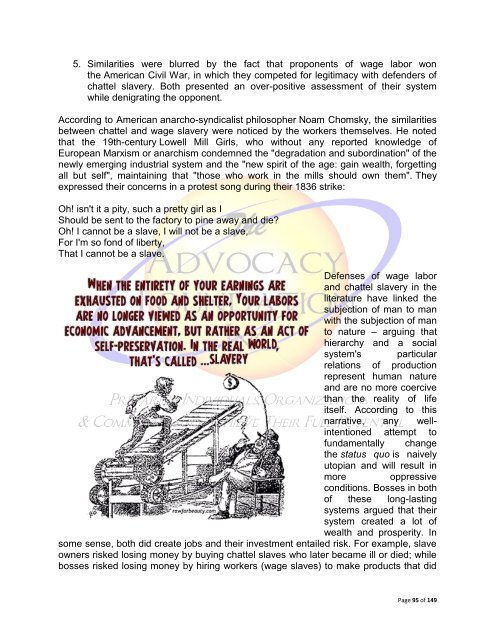Hidden Unemployment
Hidden Unemployment
Hidden Unemployment
Create successful ePaper yourself
Turn your PDF publications into a flip-book with our unique Google optimized e-Paper software.
5. Similarities were blurred by the fact that proponents of wage labor won<br />
the American Civil War, in which they competed for legitimacy with defenders of<br />
chattel slavery. Both presented an over-positive assessment of their system<br />
while denigrating the opponent.<br />
According to American anarcho-syndicalist philosopher Noam Chomsky, the similarities<br />
between chattel and wage slavery were noticed by the workers themselves. He noted<br />
that the 19th-century Lowell Mill Girls, who without any reported knowledge of<br />
European Marxism or anarchism condemned the "degradation and subordination" of the<br />
newly emerging industrial system and the "new spirit of the age: gain wealth, forgetting<br />
all but self", maintaining that "those who work in the mills should own them". They<br />
expressed their concerns in a protest song during their 1836 strike:<br />
Oh! isn't it a pity, such a pretty girl as I<br />
Should be sent to the factory to pine away and die?<br />
Oh! I cannot be a slave, I will not be a slave,<br />
For I'm so fond of liberty,<br />
That I cannot be a slave.<br />
Defenses of wage labor<br />
and chattel slavery in the<br />
literature have linked the<br />
subjection of man to man<br />
with the subjection of man<br />
to nature – arguing that<br />
hierarchy and a social<br />
system's particular<br />
relations of production<br />
represent human nature<br />
and are no more coercive<br />
than the reality of life<br />
itself. According to this<br />
narrative, any wellintentioned<br />
attempt to<br />
fundamentally change<br />
the status quo is naively<br />
utopian and will result in<br />
more oppressive<br />
conditions. Bosses in both<br />
of these long-lasting<br />
systems argued that their<br />
system created a lot of<br />
wealth and prosperity. In<br />
some sense, both did create jobs and their investment entailed risk. For example, slave<br />
owners risked losing money by buying chattel slaves who later became ill or died; while<br />
bosses risked losing money by hiring workers (wage slaves) to make products that did<br />
Page 95 of 149

















